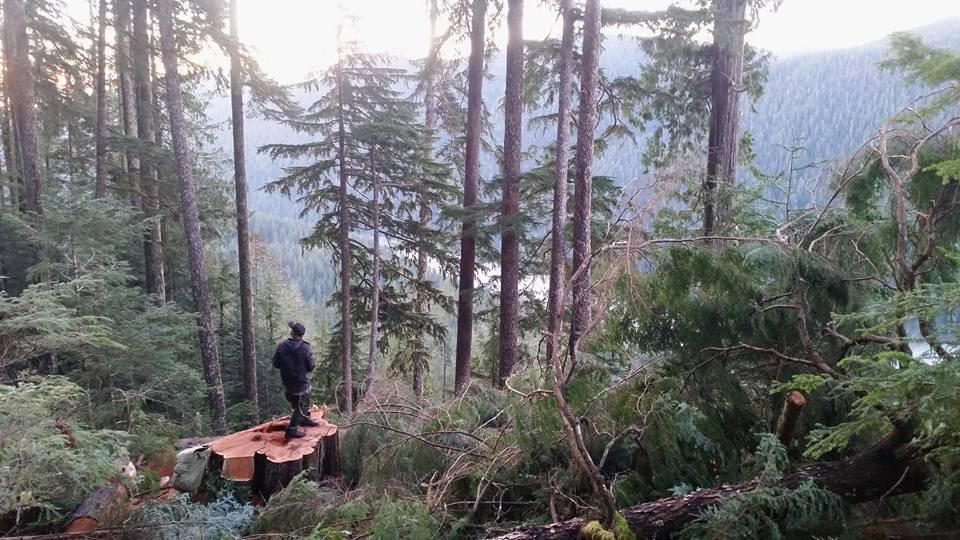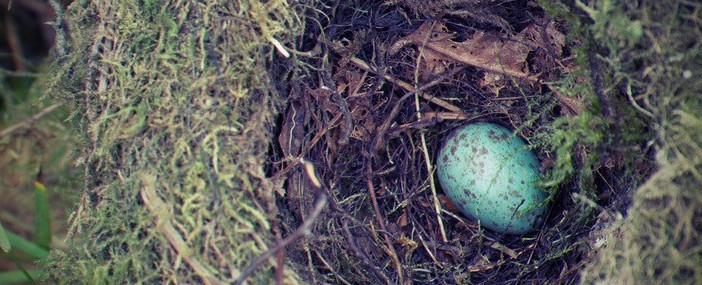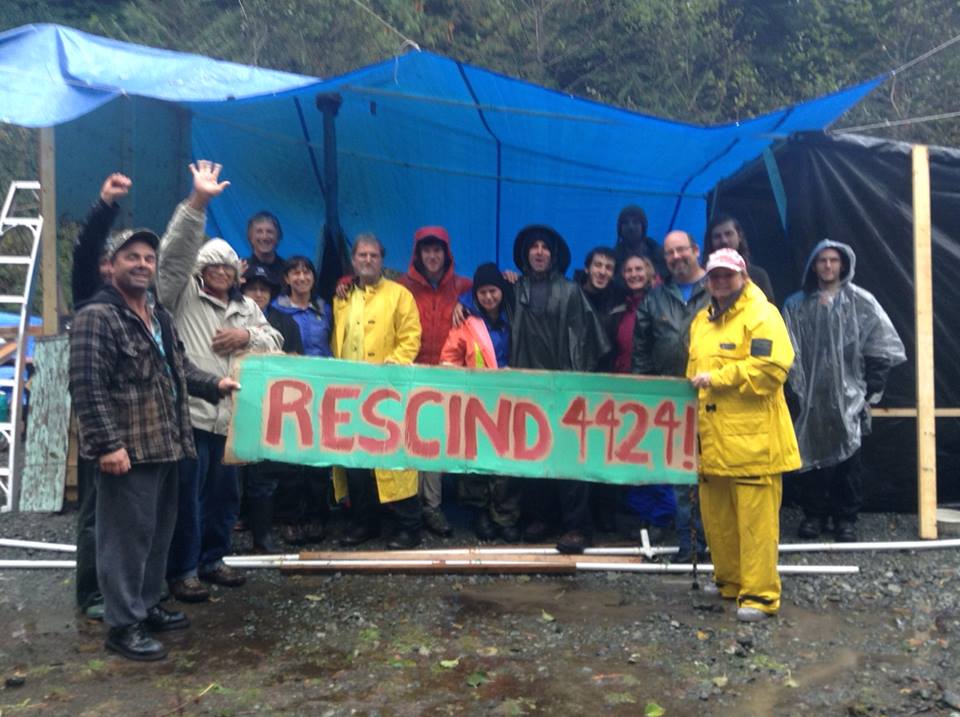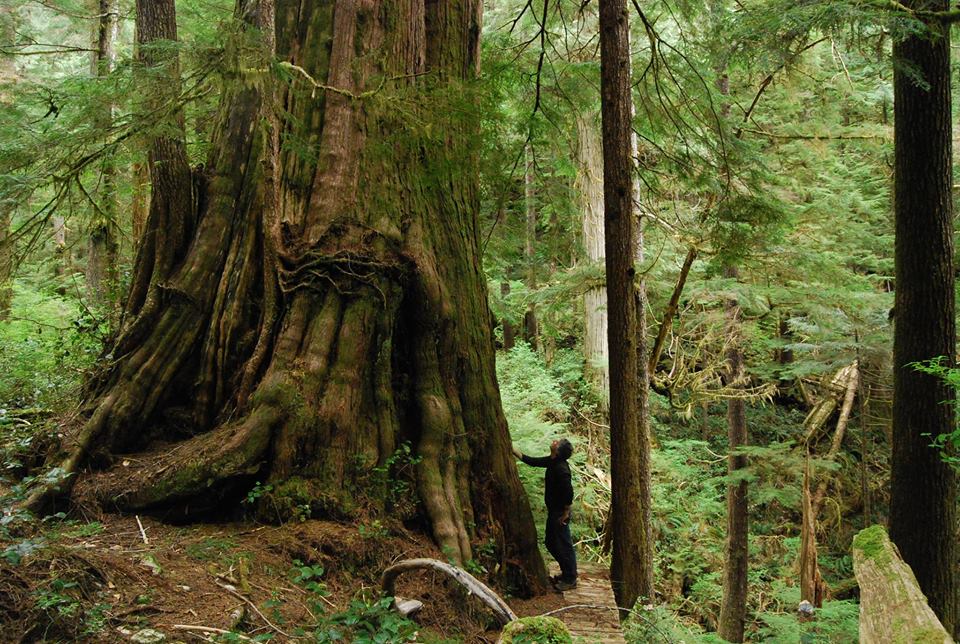
by DGR Colorado Plateau | Nov 28, 2015 | Biodiversity & Habitat Destruction, Lobbying
Editor’s Note: This letter, published at Vancouver Island Community Forest Action Network, is addressed to Canadian timber company Teal Jones Group in regards to the planned logging of Walbran Valley. You can read more about this at Renewed Defense of British Columbia’s Central Walbran Ancient Forest. Featured image of freshly cut cedar tree courtesy of Walbran Central.
By Zoe Blunt / Vancouver Island Community Forest Action Network
To Teal Jones’ executives, contractors, foresters, geologists, staff, and stakeholders:
I’m writing as a director of Vancouver Island Community Forest Action Network in Port Renfrew, BC. As forest watchdogs, we share Teal Jones’ goal of achieving the best environmental stewardship possible. I’m pleased to announce we are doubling down on our commitment to that goal.
There is a growing perception that Teal Jones’ operations in the Walbran Valley – logging an ancient forest that’s part of a beloved recreation area, on public land next to a park – is illegal, or ought to be. The public has a strong interest in ensuring that Teal Jones is not breaking any laws, statutes, or regulations.
In this spirit, we are recruiting volunteers to monitor every inch of area designated for timber harvesting, including proposed clearcuts, special management zones, wildlife habitat, leave trees, slash piles, streams, log dumps, roads, helipads, culverts, and ditches. We will check signage and radio frequencies, and visually inspect logging trucks. We will make sure the stumpage and grade-setting for the area are correct. A team of eager researchers is preparing for these tasks.
Of special concern are the karst features in the area – sensitive limestone formations underground, or in this case, on the surface. This is one of our areas of expertise, and we look forward to seeing the reports from the geologist responsible for signing off on logging those cutblocks. We plan to prepare our own reports and take all appropriate steps to ensure everyone involved is aware of the provisions of the law and fully complies with the requirements of the Forest District’s order for protection of karst.
There’s more. We will continue to follow up and document the area long after the trees are felled, to monitor reforestation, slope stabilization, road decommissioning, landslides, and habitat restoration.
We welcome the opportunity to use every legal means to achieve the goal of environmental sustainability.
We are aware of the history of violence by loggers in BC, including unprovoked attacks on peaceful protesters. We are concerned about potential hotheads on the logging crew, and for that reason we will take steps to keep our volunteers safe and give them the ability to respond appropriately, including documenting any violence or threats.
We note that rather than working with the community to find a way to preserve recreation sites and wildlife habitat, Teal Jones has taken the extreme step of suing people to get them out of the way.
Speaking for Forest Action Network, we have no intention of violating the court order. We employ strictly legal means to achieve our forest stewardship goals. Since the logging is taking place in a place designated as Crown land, we have the right and the responsibility as stakeholders to monitor and bear witness to Teal Jones’ operations.

Thrush egg, Walbran Valley. Photo courtesy Ellen Atkin.
As a non-profit society, we don’t counsel anyone to commit illegal action. We don’t condone activities like sabotage, vandalizing equipment, or spiking trees, which is the practice of hammering oversized nails into trees to threaten chainsaws and mill blades. But we remember history: two thousand trees spiked in the Walbran Valley in 1992, for example. That kind of response is not what we advocate, but we recognize the potential is out of our control.
Teal Jones’ reckless pursuit of the ancient Walbran forest has brought us to this conflict in an effort to keep the peace. The company is aggressively logging up to the park boundary, disregarding community input, and failing to obtain social license for its operations in the Central Walbran. They are operating in a rapidly changing climate, using discredited practices from the last century. They have lost sight of the goal shared by millions around the world: preserving this dwindling, irreplaceable ecosystem. We will do everything in our power to sustain these living communities.
We’re looking forward to seeing you soon.
Sincerely,
Zoe Blunt
Vancouver Island Community Forest Action Network
#Walbran
Read Teal Jones’ lawsuit against environmentalists.
Read Teal Jones notice of application for an injunction.
Background info here.

by DGR News Service | Nov 17, 2015 | Biodiversity & Habitat Destruction, Obstruction & Occupation
Bobby Arbess aka Reuben Garbanzo / Friends of Carmanah/Walbran
Sixty years of logging have left only five percent of the primary low-elevation ancient temperate rainforests of Vancouver island remaining. These are some of the world’s most biologically productive forests, attaining higher levels of plant biomass than any ecosystem on earth. The logging industry liquidated the vast majority of these diverse native old-growth forest ecosystems, replacing them with even-aged monoculture tree plantations.
In 1991, 78 days of civil disobedience successfully halted 16 kilometres of scheduled road development through the last, expansive roadless ancient forest wilderness of the Walbran Valley on south Vancouver island. The Road Stops Here campaign combined prolonged tree-sits, road blockades, office occupations, street theatre, dramatic banner hangings, international support and massive public pressure to protect the land a few kilometres upstream from Canada’s iconic Pacific Rim National Park/West Coast Trail. This area is now known as ‘ground zero’ in British Columbia’s ancient forest movement, and a new battle is heating up.
The 16,000 hectare Carmanah/Walbran Provincial Park established in 1994 was a bittersweet victory for environmental activists who fought to save the valley’s ecologically outstanding ancient forests. The park boundaries were drawn up at a roundtable of stakeholders dominated by transnational forest companies owning timber licenses in the valley. The largest and oldest western redcedar trees in the world live at the confluence of three main branches of the watershed, at the heart of the wilderness now known as the Central Walbran Ancient Forest. The 485 hectares north of Walbran river, though designated a “special management zone”, was excluded from full park protection.
Twenty-five years of intense public scrutiny and regulatory provisions have limited “harvesting” to one cutblock in the Central Walbran Ancient Forest. The area is once again the focus of a direct action struggle to keep industrial destruction such as chainsaws, heli-logging and road building out of this wild rainforest of giant trees adjoining the park.
Ongoing road building on steep slopes of the unprotected land-base opens more and more old-growth remnants to clearcut logging. In reaction, there is a growing resurgence of public support, particularly in rural communities, for preserving the unfragmented wilderness of the Ancient Forest. Before a twelve-year government policy of shutting down local unionized mills in favour of raw log exports, the rural communities were based on thriving forestry towns. Now they watch the last massive trees pass their windows on the backs of the same log trucks which exported their livelihoods.
In June 2015, logging company Teal Jones submitted a plan for eight cutblocks in the area. With approval given for a heli-logging operation to high-grade cut a grove of 500-1200 year old trees, logging is now imminent in this pocket wilderness within the traditional Pacheedaht First Nations territory.
There is a slow-growing yet persistent expression of opposition to the logging within the indigenous community, to the chagrin of band council leaders. These leaders maintain a close relationship with the logging company and manage their own logging operations elsewhere in their territory, with plans to build and run a sawmill to generate jobs and revenues.
Many economic alternatives to continued old-growth logging are being proposed to address the high unemployment and poverty in the community:
- ethnocultural forest tourism
- harvesting of non-timber and other traditional forest products such as mushrooms, berries, and basketry materials
- ecologically-managed second growth plantations
- value-added production of finished wood products
- maximizing employment per cubic metre of wood and minimizing impacts on the land, waterways and biological diversity who depend on healthy and old-growth forests for their continued survival
The remaining old-growth forests of the Walbran valley harbor the highest concentrations of the Marbled Murrelet, an endangered seabird, anywhere outside of Alaska. The forests also shelter other old-growth dependent birds including the Western Screech owl, Western Pygmy owl, and Northern Goshawk, all listed by the Committee on the Status of Endangered Wildlife in Canada (COSEWIC) as vulnerable or threatened. Fifteen years of old-growth forest canopy research has revealed hundreds of species found nowhere else in the world, inhabiting suspended soil habitats of the forest canopy. These unique microhabitats are found as much as two hundred feet off the forest floor, and are not supported by second-growth forests.
Climate activists are now pointing out the critical ecological role these old forests play for the whole world in sequestering atmospheric carbon and buffering against runaway climate change.
The provincial government has ignored several requests to protect the area, including a petition card campaign of 6000 signatures presented in the legislature in September.
Activists built a witness camp in mid-September to host a continuous presence of observers watching for the start of logging in approved cutblock 4424. Others recently established a “checkpoint” action camp on a main road into the area. In autonomous actions of non-violent civil disobedience, they have erected sporadic road barricades denying access to logging and road-building crews. Company officials have requested that activists move their camp to allow for preparation of a large landing for loading logs onto trucks. So far the activists have not responded to this request and a confrontation in this area may be imminent.
The activists are calling for people to converge on Vancouver Island to observe, support, or participate in actions; make supporting donations through their website; contact BC residents and politicians; and spread the news of the threats and the resistance. They encourage members of the international community to join the Friends of Carmanah/Walbran Facebook group to stay in the loop of daily developments and to access action updates, relevant links and articles, road instructions, and carpool information.
The Friends of Carmanah/Walbran is a loose-knit community of people around the world sharing the passion, resources and collective action to protect this ancient forest, once and for all.
by Deep Green Resistance News Service | May 12, 2013 | Indigenous Autonomy
By Reclaim PKOLS
Victoria, BC and Coast Salish Territory, BC — WEC’KINEM (Eric Pelkey), a hereditary chief of the Tsawout First Nation, with support from the Songhees and local WSÁNEĆ nations, are calling on all peoples in the Victoria area to participate in a day of action to Reclaim PKOLS, the original name of Mount Douglas, on May 22nd at 5PM. The event will reinstate the traditional name for the mountain and reclaim the site where the Douglas Treaty was first signed with the WSÁNEĆ nations.
“This is something that our elders have been calling for, for many, many years,” said Pelkey, “to bring back the names we have always used to where they belong.”
PKOLS (pronounced p’cawls), which can be translated as “White Rock” or “White Head”, reflects the Indigenous oral history of the area. Stories of PKOLS go back to nearly the beginning of time for WSÁNEĆ (Saanich) people. Historically, it has been an important meeting place; and geological findings indicate that it was the last place glaciers receded from on southern Vancouver Island. “It is a very important place for our people,” said Pelkey. “PKOLS is a part of our creation story within the WSÁNEĆ nation; and it’s where our treaty was first agreed to in 1852.”
James Douglas and his men met with WSÁNEĆ chiefs at the summit of PKOLS to discuss a treaty between the local Indigenous peoples and the settler newcomers. Outnumbered by WSÁNEĆ warriors, Douglas offered blankets and money and the eventual signing of the Douglas Treaty was understood to be a promise that the WSÁNEĆ people would not be interfered with. But this promise has since been broken.
To signify the renewal of this original nation-to-nation treaty relationship, organizers of the May 22nd action, including volunteers from local First Nations, the Indigenous Nationhood Movement and Social Coast, will stage a march up PKOLS from the base; a re-enactment of the signing of the Douglas Treaty; the telling of oral histories and traditional significance of the mountain; and the installation of a new PKOLS sign.
Beginning at 5:00pm on May 22nd, supporters will gather at the base of PKOLS in the lower parking lot, before beginning a march to the summit. “We expect this to be a major event,” said Pelkey. “We welcome all people to witness and participate in this important day for our people.
The following community organizations and individuals have endorsed the May 22nd Day of Action: AIDS Vancouver Island, Council of Canadians, Freeskool, Greenpeace, the Indigenous Nationhood Movement, Indigenous Waves Radio, International Federation of Iranian Refugees, Keepers of the Athabasca, Lifecycles Project Society, Los Altos Institute, Naomi Klein, Rising Tide Vancouver, SocialCoast.org, Social Environmental Alliance, South Asian Network for Secularism and Democracy, Together Against Poverty Society, University of Victoria Indigenous Governance Program, Vancouver Island Community Forest Action Network, Victoria Coalition for Survivors, Victoria Idle No More, The Warren Undergraduate Review.
Please see the Facebook event to support the action:
For more information about the campaign, please visit the Reclaim PKOLS website at: http://www.pkols.org/




